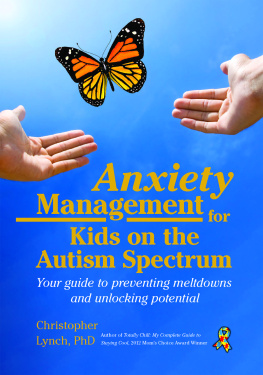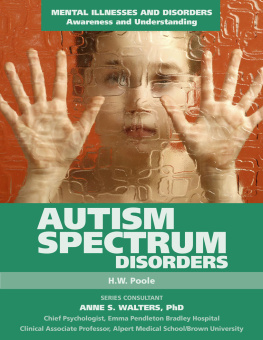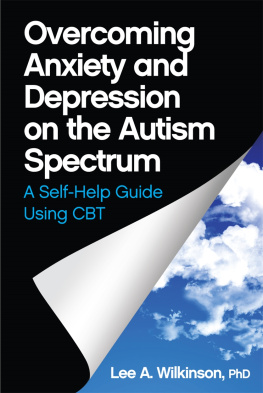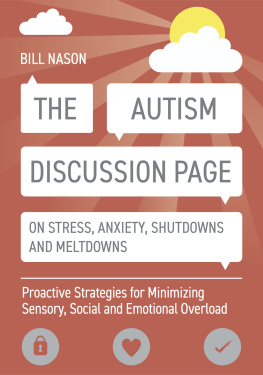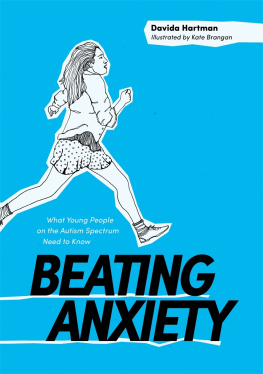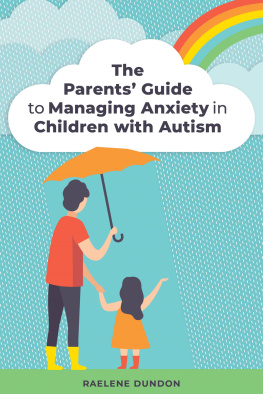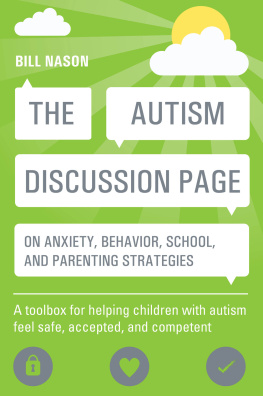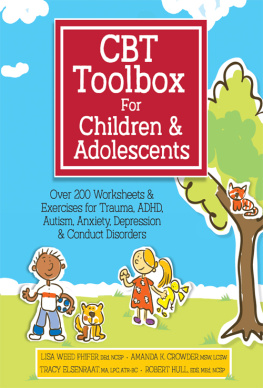About the Author
Dr. Christopher Lynch is a clinical psychologist who specializes in stress and anxiety management for children. He is currently the director of the Pediatric Behavioral Medicine Department at Goryeb Children's Hospital where he developed the aspirations life management program for children on the autism spectrum. Dr. Lynch has over twenty years of experience in working with children. It is his ambition to continue to develop services and resources that provide children with the skills needed to both cope and thrive.
www.morethanbehavior.com
ANXIETY MANAGEMENT FOR KIDS ON THE AUTISM SPECTRUM
Your guide to preventing meltdowns and unlocking potential
All marketing and publishing rights guaranteed to and reserved by:
721 W. Abram Street
Arlington, TX 76013
(800) 489-0727
(817) 277-0727
(817) 277-2270 (fax)
E-mail:
www.fhautism.com
2019 Christopher Lynch
All rights reserved.
Printed in USA.
No part of this product may be reproduced in any manner whatsoever without written permission of Future Horizons, Inc., except in the case of brief quotations embodied in reviews or unless noted within the book.
ISBN: 9781941765982
eBook Designed by Acepub
Dedication
For Dylan and Rose. Youve taught me more about autism than any textbook or research paper ever could but, more importantly, youve taught me how indomitable the human spirit can be in face of extreme challenge. For that, I am eternally grateful.

I f you are the parent of a child with autism, you have likely received lots of advice on what types of services your child should receive. You were probably told you have to get such services as speech and language therapy, behavioral training (ABA), sensory integration training, occupational therapy, physical therapy, individualized educational programming, social skills training, and a host of others. Much of this advice is sound. These types of services have made a crucial difference in improving the lives of children on the spectrum. However, one of the most common areas of concern for kids with autism has to do with managing anxiety and the meltdowns that often result from such anxiety. Indeed, anxiety can drastically impede or undo the progress made from all of the other services that a child with autism receives. And yet, services to help with stress and anxiety management were probably not on the list of things you absolutely must get for your child. This is unfortunate given the profound impact that anxiety has on the lives of children with autism and on those who teach, support, and live with them.
So, just how much does anxiety affect children on the spectrum and those who support them? To get a sense for this, lets consider what a typical day may look like by following a fictional account of a child whom we will call Jason. Jason is bright and verbal. He has received many therapeutic and educational services from a young age. As you read through the scenario, consider if your child, student, or client would respond in a similar way to the situations encountered by Jason.
Morning: Before School
Jason cant stand the sound of an alarm clock, so mom must wake him up for school. This morning mom goes up, braces herself, and as gently as possible tells Jason that its time to get up. First, Jason responds with a groan. Like other transitions, Jason doesnt like to get up unless he can do it on his own terms and at his own pace. Mom, feeling the sense of time urgency, reminds Jason that if he doesnt wake up now he is going to be late for school. This leads to an explosion of choice words, blame, and accusations directed at mom. Mom hears this every day but never gets used to it.
To help move the morning along, Jasons father prepares his breakfast. Unfortunately, dad realizes that they have run out of Jasons favorite cereal. Jason doesnt take the news very well. He yells, screams, and loudly blames his parents for the horrible injustice committed. A lot of encouragement and pleading are needed to convince Jason to eat something else.
After breakfast, Jason goes over to the video game console. Playing video games on school mornings is not allowed, but mom and dad both have to get ready for work themselves. They only turn their backs for a minute. Too late! Jason is already playing the game. He swears that he will be off in just a minute, but one minute turns to five and five minutes turns to ten. His parents have no choice but to shut the game off themselves. More yelling and blaming.
Jason finally starts to get dressed. Its cooler than expected, so his parents give Jason an extra sweatshirt. Jason refuses: No way! Im not wearing that. Its itchy and tight! After significant pleading and negotiation, they finally agree on an outfit that is acceptable. Then Jason starts to pack his book bag. He cant locate one of last nights worksheets. Major panic! Jason runs around the house searching everywhere and loudly blames his parents for losing his work. Finally, when everyone calms down for a moment, they realize that the assignment had been on the kitchen table the whole time. Jason then meticulously investigates his packed lunch. The banana has a slight brown spot on it so his father must pack him another one. His sandwich has some of the crust visible so his father must cut it off completely.
Lunch is packed, and its out the door. Jasons mother must walk him to the bus stop and wait for the bus to arrive because Jason has a fear that the bus wont show (although this has never happened). Jason anxiously and repeatedly asks, What time is it? What time is it? until the bus shows. Jasons bus arrives on time and he is finally off to school. Both mom and dad are exhausted, and its not even eight oclock in the morning.
To be fair to Jason, he did not wake up this morning and think, I want to make myself and others miserable. Instead, his behavior and mood were driven by anxiety. This anxiety occurred in reaction to situations that required sensory regulation, flexibility, and the ability to move smoothly from one activity to the next. For children without autism, these situations may not even have been noticed or, at the most, would have been seen as minor annoyances. For the child on the spectrum, however, such situations can result in high levels of anxiety and are often experienced as a major disruption to ones day. Some of the consequences of this anxious response are anger, frustration, and challenging behavior.
To help prevent minor blips from escalating into full-blown episodes (aka meltdowns), parents often have to tread carefully in the morning. Much of the morning may be spent either preventing their child from getting anxious in the first place or trying to reassure him or her when things dont go according to plan. This can be time-consuming and fatiguing. It also saps the energy of the child experiencing the anxiety.
The School Day
Anxiety is not left outside of the school doors. School can create anxiety and frustration for any student. However, anxiety is often magnified for the student with autism. To get a sense for this, lets follow Jason as he goes through his school day.

